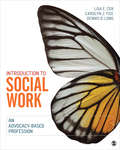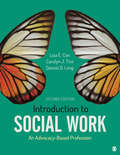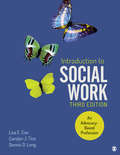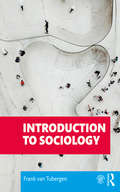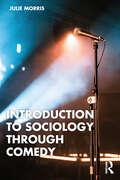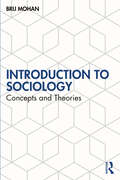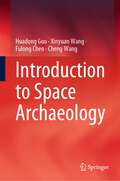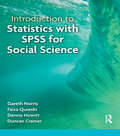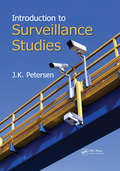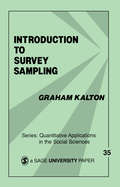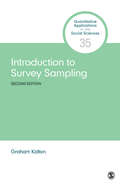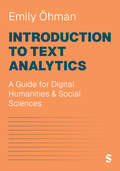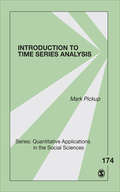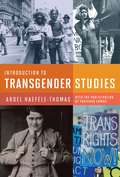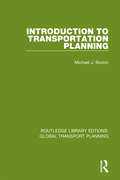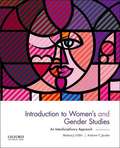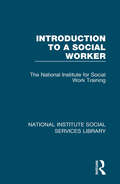- Table View
- List View
Introduction to Social Work: An Advocacy-Based Profession (Social Work in the New Century)
by Carolyn J. Tice Dennis D. Long Lisa E. CoxIntroduction to Social Work by Lisa E. Cox, Carolyn J. Tice, and Dennis D. Long is an exciting and timely new text that takes readers to the roots of the social work profession, framing its history, practice settings, and career paths through the lens of advocacy. Closely aligned with the latest Educational Policy and Accreditation Standards (EPAS), the text goes beyond standard coverage to explore such cutting-edge content as military social work, environmental issues, global/international social work, housing, and more. Robust, applied pedagogy and an emphasis on advocacy and reflective practice help underscore the transformative opportunities and contributions of social work on clinical, client, community, national, and international levels.
Introduction to Social Work: An Advocacy-Based Profession (Social Work in the New Century)
by Carolyn J. Tice Dennis D. Long Lisa E. CoxIntroduction to Social Work by Lisa E. Cox, Carolyn J. Tice, and Dennis D. Long is an exciting and timely new text that takes readers to the roots of the social work profession, framing its history, practice settings, and career paths through the lens of advocacy. Closely aligned with the latest Educational Policy and Accreditation Standards (EPAS), the text goes beyond standard coverage to explore such cutting-edge content as military social work, environmental issues, global/international social work, housing, and more. Robust, applied pedagogy and an emphasis on advocacy and reflective practice help underscore the transformative opportunities and contributions of social work on clinical, client, community, national, and international levels.
Introduction to Social Work: An Advocacy-Based Profession (Social Work in the New Century)
by Carolyn J. Tice Dennis D. Long Lisa E. Cox<p>The best-selling <i>Introduction to Social Work</i> by Lisa E. Cox, Carolyn J. Tice, and Dennis D. Long takes students to the root of the social work profession by covering its history, practice settings, and career paths within a unique advocacy framework. This advocacy practice and policy model comprised of four components—economic and social justice, a supportive environment, human needs and rights, and political access—provides an effective lens for viewing today’s social issues. Throughout the book, an emphasis on advocacy underscores the transformative opportunities and contributions of social work on not just the clinical/client level, but also at organizational, community, national, and international levels. <p>The Second Edition closely aligns with the latest Educational Policy and Accreditation Standards (EPAS) from the Council on Social Work Education (CSWE) and references the 2018 Code of Ethics from the National Association of Social Workers (NASW). Through the authors’ inclusion of reflective practice, students will be encouraged to engage in critical thought and contemplate a career in social work.</p>
Introduction to Social Work: An Advocacy-Based Profession (Social Work in the New Century)
by Carolyn J. Tice Dennis D. Long Lisa E. CoxThe best-selling Introduction to Social Work by Lisa E. Cox, Carolyn J. Tice, and Dennis D. Long takes students to the root of the social work profession by covering its history, practice settings, and career paths within a unique advocacy framework. This advocacy practice and policy model comprised of four components—economic and social justice, a supportive environment, human needs and rights, and political access—provides an effective lens for viewing today’s social issues. Throughout the book, an emphasis on advocacy underscores the transformative opportunities and contributions of social work on not just the clinical/client level, but also at organizational, community, national, and international levels. The Second Edition closely aligns with the latest Educational Policy and Accreditation Standards (EPAS) from the Council on Social Work Education (CSWE) and references the 2018 Code of Ethics from the National Association of Social Workers (NASW). Through the authors’ inclusion of reflective practice, students will be encouraged to engage in critical thought and contemplate a career in social work.
Introduction to Social Work: An Advocacy-Based Profession (Social Work in the New Century)
by Carolyn J. Tice Dennis D. Long Lisa E. CoxThe award-winning Introduction to Social Work: An Advocacy-Based Profession takes students on an exploration of what social work is, what it was historically, and how to be an effective advocate as a social worker moving forward. Built on a unique advocacy practice and policy model comprised of four components—economic and social justice, a supportive environment, human needs and rights, and political access—the book provides a crucial lens for viewing today’s social issues. Best-selling authors Lisa E. Cox, Carolyn J. Tice, and Dennis D. Long emphasize advocacy throughout all sectors of social work, with a focus on environmental, international, and military social work. The Third Edition closely aligns with the latest Educational Policy and Accreditation Standards (EPAS) from the Council on Social Work Education (CSWE); references the 2018 Code of Ethics from the National Association of Social Workers (NASW); and includes profound discussions of societal impacts on areas of public health, policy, juvenile justice, race, inequality, social movements, and self-care. This title is accompanied by a complete teaching and learning package. Contact your SAGE representative to request a demo. Digital Option / Courseware SAGE Vantage is an intuitive digital platform that delivers this text’s content and course materials in a learning experience that offers auto-graded assignments and interactive multimedia tools, all carefully designed to ignite student engagement and drive critical thinking. Built with you and your students in mind, it offers simple course set-up and enables students to better prepare for class. Assignable Video with Assessment Assignable video (available with SAGE Vantage) is tied to learning objectives and curated exclusively for this text to bring concepts to life. Watch a sample video on Social Justice. LMS Cartridge: Import this title’s instructor resources into your school’s learning management system (LMS) and save time. Don’t use an LMS? You can still access all of the same online resources for this title via the password-protected Instructor Resource Site.
Introduction to Social Work: An Advocacy-Based Profession (Social Work in the New Century)
by Carolyn J. Tice Dennis D. Long Lisa E. CoxThe award-winning Introduction to Social Work: An Advocacy-Based Profession takes students on an exploration of what social work is, what it was historically, and how to be an effective advocate as a social worker moving forward. Built on a unique advocacy practice and policy model comprised of four components—economic and social justice, a supportive environment, human needs and rights, and political access—the book provides a crucial lens for viewing today’s social issues. Best-selling authors Lisa E. Cox, Carolyn J. Tice, and Dennis D. Long emphasize advocacy throughout all sectors of social work, with a focus on environmental, international, and military social work. The Third Edition closely aligns with the latest Educational Policy and Accreditation Standards (EPAS) from the Council on Social Work Education (CSWE); references the 2018 Code of Ethics from the National Association of Social Workers (NASW); and includes profound discussions of societal impacts on areas of public health, policy, juvenile justice, race, inequality, social movements, and self-care. This title is accompanied by a complete teaching and learning package. Contact your SAGE representative to request a demo. Digital Option / Courseware SAGE Vantage is an intuitive digital platform that delivers this text’s content and course materials in a learning experience that offers auto-graded assignments and interactive multimedia tools, all carefully designed to ignite student engagement and drive critical thinking. Built with you and your students in mind, it offers simple course set-up and enables students to better prepare for class. Assignable Video with Assessment Assignable video (available with SAGE Vantage) is tied to learning objectives and curated exclusively for this text to bring concepts to life. Watch a sample video on Social Justice. LMS Cartridge: Import this title’s instructor resources into your school’s learning management system (LMS) and save time. Don’t use an LMS? You can still access all of the same online resources for this title via the password-protected Instructor Resource Site.
Introduction to Sociology
by Frank van TubergenComprehensive and engaging, this textbook introduces students not only to foundational sociological work, but also to insights from contemporary sociological theory and research. This combined approach ensures that students become familiar with the core of sociology: key concepts, theories, perspectives, methods, and findings. Students will acquire the ability to think like a sociologist, investigate and understand complex social phenomena. This text presents a complete sociological toolkit, guiding students in the art of asking good sociological questions, devising a sophisticated theory and developing methodologies to observe social phenomena. The chapters of this book build cumulatively to equip students with the tools to quickly understand any new sociological topic or contemporary social problem. The textbook also applies the sociological toolkit to selected key sociological issues, showing how specific sociological topics can be easily investigated and understood using this approach. Taking a global and comparative perspective, the book covers a rich diversity of sociological topics and social problems, such as crime, immigration, race and ethnicity, media, education, family, organizations, gender, poverty, modernization and religion. The book presents a range of helpful pedagogical features throughout, such as: Chapter overview and learning goals summaries at the start of every chapter; Thinking like a sociologist boxes, encouraging students to reflect critically on learning points; Principle boxes, summarizing key sociological principles; Theory schema boxes, presenting sociological theories in a clear, understandable manner; Stylized facts highlighting key empirical findings and patterns; Key concepts and summary sections at the end of every chapter; and Companion website providing additional material for every chapter for both instructors and students, including PowerPoint lecture notes, discussion questions and answers, multiple-choice questions, further reading and a full glossary of terms. This clear and accessible text is essential reading for students taking introductory courses in sociology. It will also be useful for undergraduate and graduate courses in other social science disciplines, such as psychology, economics, human geography, demography, communication studies, education sciences, political science and criminology.
Introduction to Sociology
by OpenStaxIntroduction to Sociology was written by teams of sociology professors and writers and peer-reviewed by college instructors nationwide. The textbook was developed for OpenStax College as part of its Open Educational Resources initiative. This free online text meets standard scope and sequence requirements and incorporates current events such as the Occupy Wall Street movement. The text is designed for the Introduction to Sociology course at any two- to four-year school.
Introduction to Sociology First Semester FYBA New NEP Syllabus - SPPU
by Dr Jyoti Suhas Gagangras Dr Sudhir Ashruba YevleThe textbook Introduction to Sociology for first-year undergraduate students, aligned with the NEP 2024 syllabus, provides a foundational understanding of sociology as a discipline. It introduces key concepts such as the nature, scope, and significance of sociology, emphasizing the study of human interactions, social structures, and institutions. The book explores the sociological perspective, enabling students to analyze societal patterns and understand cultural diversity. It also examines the role of sociology in addressing social challenges, fostering critical thinking, and contributing to social change. With a focus on practical applications, the textbook highlights the importance of sociology in shaping policies, improving social cohesion, and promoting equity. Designed as a comprehensive resource for students and educators, it combines theoretical insights with real-world examples, making it an essential guide for academic studies and societal understanding.
Introduction to Sociology Through Comedy
by Julie MorrisQuestioning society and one’s place in it is a common theme in both comedy and sociology. Understanding and subverting hierarchies and norms, exploring deviance and taboos, and relating lived experience to broader questions all hold a crucial place for them both.Introduction to Sociology Through Comedy teaches foundational sociological concepts using comedy, first considering the history of sociology before employing examples from comedians – including standalone comedy bits, sketches, characters, and scenes – to illustrate a specific theory, concept, or social phenomenon. The profession of comedy is then used as a case study for the application of sociological concepts, such as impression management, social stratification, racial segregation, deviance, and stigma, allowing readers to gain familiarity with the concepts while simultaneously practicing their application.This book explains why we laugh by applying theories of humor, which will bolster students’ understanding of sociological principles by forcing them to question their own assumptions – helping them to put why they laugh into sociological terms.
Introduction to Sociology: Concepts and Theories
by Brij MohanThis textbook explores the emergence of sociology as a distinct social science. Focusing on the evolution of social theories, movements and ideas through history, it analyses the dynamic relationship between the individual and the larger social forces around them. This volume examines the definitive aspects of societies, communities and social groups, and their intersections with culture, political and economic movements and religious institutions. It establishes the connections between sociology and other disciplines such as philosophy, history, political science, economics, psychology and anthropology to explore the interdependence between different realms of social life. The chapters in this book explain and highlight the significance of quantitative and qualitative methods of research in understanding the dynamics of social life. Drawing from the works of classical social theorists such as Auguste Comte, Herbert Spencer, Karl Marx, Emile Durkheim and Max Weber, this book traces the development of sociological perspectives and theories and their relevance in the history of ideas. Lucid and comprehensive, this textbook will be useful for undergraduate and postgraduate students of sociology, development studies, history of ideas, sociological thought, social theory, research methods, political science and anthropology.
Introduction to Space Archaeology
by Cheng Wang Xinyuan Wang Fulong Chen Huadong GuoThis book presents the basic principles and the latest advances in space archaeology. Following general reviews of the state of the art of Earth observation technologies and archaeology, the book introduces the principles and methods of space archaeology, remote sensing methods for archaeological survey, and integrated archaeological survey methods including geophysics, virtual reality, web technologies, global positioning systems (GPS), geographical information systems (GIS), and big data. The book then presents two chapters on case studies of word heritage sites in Asia, Europe, Africa, and Americas, including three major world heritage sites in China: The Great Wall, Grand Canal, and Silk Road. The last chapter of the book discusses the future of space archaeology. This book has an interdisciplinary appeal and scholars with an interest in cultural heritage and remote sensing technologies for Earth value its contribution.
Introduction to Statistics with SPSS for Social Science
by Dennis Howitt Duncan Cramer Gareth Norris Faiza QureshiThis is a complete guide to statistics and SPSS for social science students. Statistics with SPSS for Social Science provides a step-by-step explanation of all the important statistical concepts, tests and procedures. It is also a guide to getting started with SPSS, and includes screenshots to illustrate explanations. With examples specific to social sciences, this text is essential for any student in this area.
Introduction to Surveillance Studies
by J.K. PetersenSurveillance is a divisive issue one might say it is inherently controversial. Used by private industry, law enforcement, and for national security, it can be a potent tool for protecting resources and assets. It can also be extremely invasive, calling into question our basic rights to freedom and privacy. Introduction to Surveillance Studies explo
Introduction to Survey Sampling
by Dr Graham KaltonReviews sampling methods used in surveys: simple random sampling, systematic sampling, stratification, cluster and multi-stage sampling, sampling with probability proportional to size, two-phase sampling, replicated sampling, panel designs, and non-probability sampling. Kalton discusses issues of practical implementation, including frame problems and non-response, and gives examples of sample designs for a national face-to-face interview survey and for a telephone survey. He also treats the use of weights in survey analysis, the computation of sampling errors with complex sampling designs, and the determination of sample size.
Introduction to Survey Sampling (Quantitative Applications in the Social Sciences #35)
by Graham KaltonSample design is key to all surveys, fundamental to data collection, and to the analysis and interpretation of the data. Introduction to Survey Sampling, Second Edition provides an authoritative and accessible source on sample design strategies and procedures that is a required reading for anyone collecting or analyzing survey data. Graham Kalton discusses different types of probability samples, stratification (pre and post), clustering, dual frames, replicates, response, base weights, design effects, and effective sample size. It is a thorough revision and update of the first edition, published more than 35 years ago. Although the concepts of probability sampling are largely the same, there have been important developments in the application of these concepts as research questions have increasingly spanned multiple disciplines, computers have become central to data collection as well as data analysis, and cell phones have become ubiquitous, but response rates have fallen, and public willingness to engage in survey research has waned. While most of the volume focuses on probability samples, there is also a chapter on nonprobability samples, which are becoming increasingly important with the rise of social media and the world wide web.
Introduction to Survey Sampling (Quantitative Applications in the Social Sciences #35)
by Graham KaltonSample design is key to all surveys, fundamental to data collection, and to the analysis and interpretation of the data. Introduction to Survey Sampling, Second Edition provides an authoritative and accessible source on sample design strategies and procedures that is a required reading for anyone collecting or analyzing survey data. Graham Kalton discusses different types of probability samples, stratification (pre and post), clustering, dual frames, replicates, response, base weights, design effects, and effective sample size. It is a thorough revision and update of the first edition, published more than 35 years ago. Although the concepts of probability sampling are largely the same, there have been important developments in the application of these concepts as research questions have increasingly spanned multiple disciplines, computers have become central to data collection as well as data analysis, and cell phones have become ubiquitous, but response rates have fallen, and public willingness to engage in survey research has waned. While most of the volume focuses on probability samples, there is also a chapter on nonprobability samples, which are becoming increasingly important with the rise of social media and the world wide web.
Introduction to Text Analytics: A Guide for Digital Humanities & Social Sciences
by Emily ÖhmanThis easy-to-follow book will revolutionise how you approach text mining and data analysis as well as equipping you with the tools, and confidence, to navigate complex qualitative data. It can be challenging to effectively combine theoretical concepts with practical, real-world applications but this accessible guide provides you with a clear step-by-step approach. Written specifically for students and early career researchers this pragmatic manual will: • Contextualise your learning with real-world data and engaging case studies. • Encourage the application of your new skills with reflective questions. • Enhance your ability to be critical, and reflective, when dealing with imperfect data. Supported by practical online resources, this book is the perfect companion for those looking to gain confidence and independence whilst using transferable data skills.
Introduction to Text Analytics: A Guide for Digital Humanities & Social Sciences
by Emily ÖhmanThis easy-to-follow book will revolutionise how you approach text mining and data analysis as well as equipping you with the tools, and confidence, to navigate complex qualitative data. It can be challenging to effectively combine theoretical concepts with practical, real-world applications but this accessible guide provides you with a clear step-by-step approach. Written specifically for students and early career researchers this pragmatic manual will: • Contextualise your learning with real-world data and engaging case studies. • Encourage the application of your new skills with reflective questions. • Enhance your ability to be critical, and reflective, when dealing with imperfect data. Supported by practical online resources, this book is the perfect companion for those looking to gain confidence and independence whilst using transferable data skills.
Introduction to Time Series Analysis (Quantitative Applications in the Social Sciences #174)
by Dr Mark PickupIntroducing time series methods and their application in social science research, this practical guide to time series models is the first in the field written for a non-econometrics audience. Giving readers the tools they need to apply models to their own research, Introduction to Time Series Analysis, by Mark Pickup, demonstrates the use of—and the assumptions underlying—common models of time series data including finite distributed lag; autoregressive distributed lag; moving average; differenced data; and GARCH, ARMA, ARIMA, and error correction models. “This volume does an excellent job of introducing modern time series analysis to social scientists who are already familiar with basic statistics and the general linear model.” —William G. Jacoby, Michigan State University
Introduction to Time Series Analysis (Quantitative Applications in the Social Sciences #174)
by Dr Mark PickupIntroducing time series methods and their application in social science research, this practical guide to time series models is the first in the field written for a non-econometrics audience. Giving readers the tools they need to apply models to their own research, Introduction to Time Series Analysis, by Mark Pickup, demonstrates the use of—and the assumptions underlying—common models of time series data including finite distributed lag; autoregressive distributed lag; moving average; differenced data; and GARCH, ARMA, ARIMA, and error correction models. “This volume does an excellent job of introducing modern time series analysis to social scientists who are already familiar with basic statistics and the general linear model.” —William G. Jacoby, Michigan State University
Introduction to Transgender Studies
by Ardel Haefele-ThomasThis is the first introductory textbook intended for transgender/trans studies at the undergraduate level. The book can also be used for related courses in LGBTQ, queer, and gender/feminist studies.It encompasses and connects global contexts, intersecting identities, historic and contemporary issues, literature, history, politics, art, and culture. Ardel Haefele-Thomas embraces the richness of intersecting identities—how race, ethnicity, sexual orientation, class, nation, religion, and ability have cross-influenced to shape the transgender experience and trans culture across and beyond the binary. Written by an accomplished teacher with experience in a wide variety of higher learning institutions, this new text inspires readers to explore not only contemporary transgender issues and experiences but also the global history of gender diversity through the ages.Introduction to Transgender Studies features:-A welcoming approach that creates a safe space for a wide range of students, from those who have never thought about gender issues to those who identify as transgender, trans, nonbinary, agender, and/or gender expansive.-Writings from the Community essays that relate the chapter theme to the lived experiences of trans and LGB people and allies from different parts of the world.-Key concepts, film and media suggestions, topics for discussion, activities, and ideas for writing and research to engage students and serve as a review at exam time.-Instructors’ resources that will be available that include key teaching points with discussion questions, activities, research projects, tips for using the media suggestions, PowerPoint presentations, and sample syllabi for various course configurations.Intended for introductory transgender, LGBTQ+, or gender studies courses through upper-level electives related to the expanding field of transgender studies, this text has been successfully class-tested in community colleges and public and private colleges and universities.
Introduction to Transportation Planning (Routledge Library Edtions: Global Transport Planning #5)
by Michael J. BrutonWhen originally published in 1975, (here re-issuing the 3rd edition of 1985), this was the only genuinely introductory textbook to the subject of transportation planning. The introductory chapter places the issue of transport in its broader societal context, relating it to demographic, socio-economic, political and environmental considerations. The increasing importance of technology is recognized in the chapter which covers commonly used software packages. As a whole the book provides a basic introduction to the traffic estimation stage of the transport planning process and forms a general guide and survey to the whole subject.
Introduction to Women's and Gender Studies: An Interdisciplinary Approach
by Melissa J. Gillis Andrew T. JacobsThis book is a truly interdisciplinary and intersectional text featuring global examples for women's, gender, and sexuality studies. Its student-centered rhetorical approach and pedagogical features―including an engaging image program, prompts for activism, a comprehensive glossary, appendices of key terms, annotated bibliographies for additional reading, and "Feminisms in Brief"―aid students in assimilating fundamental women's and gender studies terms and concepts. <P><P>While it is a textbook and not an anthology, it adopts the best facets of the anthology approach: it includes discussions of frequently anthologized writers and writing that is more engaging and narrative in style than traditional textbooks. The book systematically covers core interdisciplinary concepts so that students are prepared for women's and gender studies courses in a variety of disciplines.
Introduction to a Social Worker (National Institute Social Services Library)
by The National Institute for Social Work TrainingOriginally published in 1964, this was an introduction to social casework, that is social work with individuals and families. It was written for students at the beginning of their training and, while intended for the social worker, it would also prove useful to other students of the social sciences and interesting to the ordinary citizen who wanted to know what social work could offer either to people in trouble or to those who adopted it as a career. The book was both authoritative and up-to-date at the time, in a field in which methods of training had evolved quite rapidly. To this its origin bears witness: the preparatory work was done by Miss Florence Mitchell, an experienced social worker and teacher of social casework. The book was shaped in consultation with other practitioners and teachers, including Dr Younghusband and Miss K. M. Lewis of the National Institute whose work had done so much to shape modern methods of training. The first chapter gives a picture of people who need the social worker’s help. It is followed by a brief survey of methods, by three chapters of case studies and by a final chapter on social work in the social services. The book thus combines a philosophy with practical guidance.
